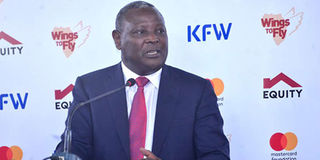Equity's CEO James Mwangi raises bar in local philanthropy

Equity Bank CEO James Mwangi speaks during a 'Wings to Fly' event at Kenyatta University on January 3, 2020. PHOTO | FILE | NATION MEDIA GROUP
What you need to know:
- He has been credited with pioneering a microfinance revolution in Kenya, and for democratising financial access by removing entry barriers for those in the bottom of the pyramid.
- To oversee the implementation of the PPE project he is helping to fund, Mwangi has taken care to put together a committee of medics and professionals.
Last Thursday's media headlines were all about Equity Bank CEO James Mwangi's philanthropic milestone - his gift of Sh300 million to the Covid-19 emergency fund.
That's some serious dough, in any currency, to dole out to a single cause. The Equity Group Foundation, which he chairs, matched the personal donation with another Sh300 million.
As stipulated, the money will go into buying personal protective equipment (PPEs) for health workers dealing with Covid-19 in public hospitals.
Mwangi is among the best known bankers and entrepreneurs in the country.
He has been credited with pioneering a microfinance revolution in Kenya, and indeed in the region, and for democratising financial access by removing entry barriers for those in the bottom of the pyramid.
Without doubt, his donation to the Covid-19 fund, surpassing even what some big corporates have given, has set a new bar in local philanthropy.
It wouldn't make sense for bequests of this size to go without keen follow-up, especially in a country where corruption and officialdom get intertwined, and indeed where a controversy is already brewing about some dodgy expenditures drawn from a $60 million World Bank grant to the national anti-Covid effort.
WORTHY ASSOCIATES
To oversee the implementation of the PPE project he is helping to fund, Mwangi has taken care to put together a committee of medics and professionals, which Equity Bank board chairman Isaac Macharia will chair, but which will work closely with the Kenya Medical Association and the Ministry of Health.
A feature of Mwangi's philanthropy is the way it leverages on his networks, either through linkages with institutions he is connected with like the Equity Foundation, or through others who share his vision.
A case in point is MasterCard, who supplemented his Sh300 million gift with a Sh500 million donation of their own, thus raising the total Mwangi-Equity-MasterCard anti-Covid outlay to Sh1.1 billion.
In fact, MasterCard Foundation partners with Equity Bank in sponsoring the annual "Wings to Fly" programme, which pays for bright but disadvantaged Kenyan pupils to study at top US universities.
In the same week Mwangi was making his contribution for PPEs, Equity Bank's Rwandan subsidiary donated 22,225 Covid-19 testing kits worth a billion Rwandan francs (equivalent to $1 million).
Half of this money was raised by the staff of Equity Bank Rwanda while the other $500,000 was contributed by Mwangi's family.
PRESSING CONCERNS
Philanthropy is often confused with charity. They are not quite the same. There is a fine line in between.
Strictly speaking, charity focuses at alleviating an immediate problem, such as that of a starving family or a sick child.
Philanthropy seeks sustainable solutions in a broader sense, be they economic or social. For example, Kenyan philanthropist Manu Chandaria, through his venerable Chandaria Foundation, funds a multifaceted portfolio of initiatives as varied as the environment, education and children with special needs.
Another wealthy local philanthropist, Narendra Raval (a large-scale cement and steel manufacturer who is popularly known as "Guru"), announced in 2017 that he will put down in his will that half of his $500 million private fortune goes to social programmes for the poor.
Mwangi's own philanthropy often targets particular institutions. He gave Sh100 million towards setting up an incubation centre at Meru University of Science and Technology, where he serves as chancellor.
Other beneficiaries of his largesse are the Anglican Church of Uganda (Ksh30 million for the construction of their Church House in Kampala), and a Sh30 million gift to support the Africa Leadership Academy in South Africa, which grooms young generation African "leaders".
One donation, of Sh50 million, must have been particularly dear to Mwangi's heart. It was to Nyagatugu Secondary School, located near his birthplace in Murang'a County.
LEADERSHIP
The Equity chief is treading on footsteps other big-name African philanthropists have walked. Think of Nigerian entrepreneur Tony Elumelu, perhaps the most innovative of the modern crop of African philanthropists.
His Tony Elumelu Foundation, with its $100 million endowment, is a private sector-driven champion of entrepreneurship that trains and seeds aspiring businessmen from all over Africa.
Elumelu's even richer countryman, the industrialist Aliko Dangote, has a foundation that primarily deals with issues of health, nutrition and education, and has a significant imprint across the continent.
The foundation's $1.25 billion endowment is the biggest of any other in Africa. Then there is the Mo Ibrahim Foundation, the brainchild of the Sudanese founder of Celtel, which has a unique mission: the critical importance of good governance and leadership in Africa.
It is best known for the lavish cash prize it bestows on retired African leaders who it deems to have demonstrated good, democratic governance while in office.
With a $5 million giveway over ten years, it sets up the distinguished retirees for life.





